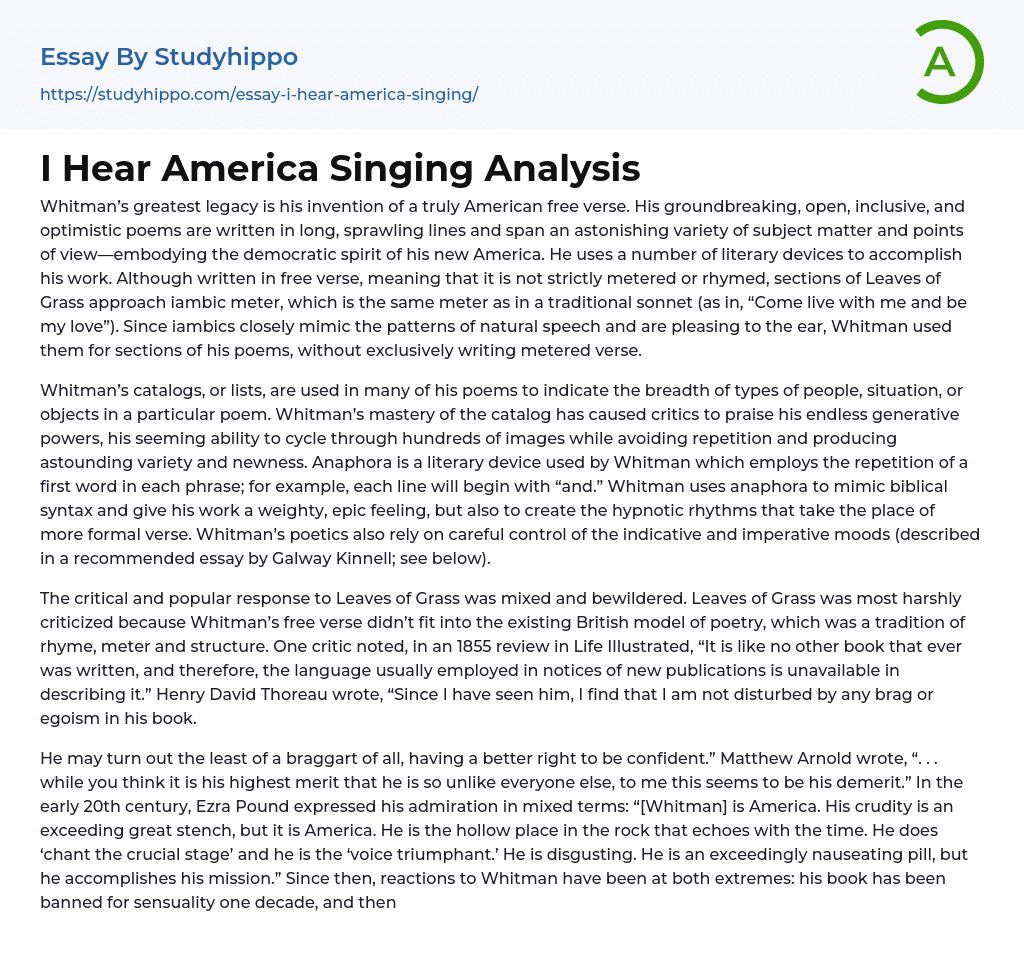Whitman’s greatest legacy is his invention of a truly American free verse. His groundbreaking, open, inclusive, and optimistic poems are written in long, sprawling lines and span an astonishing variety of subject matter and points of view—embodying the democratic spirit of his new America. He uses a number of literary devices to accomplish his work. Although written in free verse, meaning that it is not strictly metered or rhymed, sections of Leaves of Grass approach iambic meter, which is the same meter as in a traditional sonnet (as in, “Come live with me and be my love”). Since iambics closely mimic the patterns of natural speech and are pleasing to the ear, Whitman used them for sections of his poems, without exclusively writing metered verse.
Whitman’s catalogs, or lists, are used in many of
...his poems to indicate the breadth of types of people, situation, or objects in a particular poem. Whitman’s mastery of the catalog has caused critics to praise his endless generative powers, his seeming ability to cycle through hundreds of images while avoiding repetition and producing astounding variety and newness. Anaphora is a literary device used by Whitman which employs the repetition of a first word in each phrase; for example, each line will begin with “and.” Whitman uses anaphora to mimic biblical syntax and give his work a weighty, epic feeling, but also to create the hypnotic rhythms that take the place of more formal verse. Whitman’s poetics also rely on careful control of the indicative and imperative moods (described in a recommended essay by Galway Kinnell; see below).
The critical and popular response to Leaves of
Grass was mixed and bewildered. Leaves of Grass was most harshly criticized because Whitman’s free verse didn’t fit into the existing British model of poetry, which was a tradition of rhyme, meter and structure. One critic noted, in an 1855 review in Life Illustrated, “It is like no other book that ever was written, and therefore, the language usually employed in notices of new publications is unavailable in describing it.” Henry David Thoreau wrote, “Since I have seen him, I find that I am not disturbed by any brag or egoism in his book.
He may turn out the least of a braggart of all, having a better right to be confident.” Matthew Arnold wrote, “. . . while you think it is his highest merit that he is so unlike everyone else, to me this seems to be his demerit.” In the early 20th century, Ezra Pound expressed his admiration in mixed terms: “[Whitman] is America. His crudity is an exceeding great stench, but it is America. He is the hollow place in the rock that echoes with the time. He does ‘chant the crucial stage’ and he is the ‘voice triumphant.’ He is disgusting. He is an exceedingly nauseating pill, but he accomplishes his mission.” Since then, reactions to Whitman have been at both extremes: his book has been banned for sensuality one decade, and then praised as the cornerstone of American poetics the next.
Summary and Analysis: Inscriptions I Hear America Singing""
The poet hears the "varied carols" of all the people who contribute to the life and culture of America. The mechanic, the carpenter, the mason, the boatman,
the shoemaker, and the woodcutter all join in the chorus of the nation. The singing of the mother, the wife, and the girl at work expresses their joy and their feeling of fruition. These are highly individualistic men and women. Each person sings "what belongs to him or her and to none else."
This poem underscores Whitman's basic attitude toward America, which is part of his ideal of human life. The American nation has based its faith on the creativeness of labor, which Whitman glorifies in this poem. The catalog of craftsmen covers not only the length and breadth of the American continent but also the large and varied field of American achievement. This poem expresses Whitman's love of America — its vitality, variety, and the massive achievement which is the outcome of the creative endeavor of all its people. It also illustrates Whitman's technique of using catalogs consisting of a list of people.
- John Locke essays
- 9/11 essays
- A Good Teacher essays
- A Healthy Diet essays
- A Modest Proposal essays
- A&P essays
- Academic Achievement essays
- Achievement essays
- Achieving goals essays
- Admission essays
- Advantages And Disadvantages Of Internet essays
- Alcoholic drinks essays
- Ammonia essays
- Analytical essays
- Ancient Olympic Games essays
- APA essays
- Arabian Peninsula essays
- Argument essays
- Argumentative essays
- Art essays
- Atlantic Ocean essays
- Auto-ethnography essays
- Autobiography essays
- Ballad essays
- Batman essays
- Binge Eating essays
- Black Power Movement essays
- Blogger essays
- Body Mass Index essays
- Book I Want a Wife essays
- Boycott essays
- Breastfeeding essays
- Bulimia Nervosa essays
- Business essays
- Business Process essays
- Canterbury essays
- Carbonate essays
- Catalina de Erauso essays
- Cause and Effect essays
- Cesar Chavez essays
- Character Analysis essays
- Chemical Compound essays
- Chemical Element essays
- Chemical Substance essays
- Cherokee essays
- Cherry essays
- Childhood Obesity essays
- Chlorine essays
- Classification essays
- Cognitive Science essays




